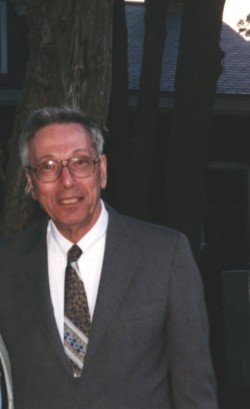« Obituaries | Barney Kirsch Schwalberg
Obituary
view guestbook | sign guestbook
Barney Kirsch Schwalberg

Date of Death: November 17, 2024
Date of Birth: August 2, 1929
Biography:
Barney Kirsch Schwalberg was born on August 2, 1929 in New York City to Claire Kirsch Schwalberg and Reuben Schwalberg, a pharmacist. When Barney was very young, his parents divorced and Claire married Roman Slobodin, a writer and newspaper reporter.
In 1938, the family moved to Palestine, to the Jerusalem suburb of Talpiyot, where Roman was a reporter for the Jewish Telegraph Agency. Barney recalled speaking fluent Hebrew as a child and, along with his older brother Bobby, lighting firecrackers under the camels. However, the posting ended abruptly with the start of World War II, and the family left on the last boat out with money borrowed from friends. They re-settled in Washington Heights. Barney attended the Bronx High School of Science and the College of the City of New York, but his main interest was chess. When his family moved to Philadelphia, Barney transferred to the University of Pennsylvania and graduated from the Wharton School with a degree in General Studies with a focus on statistics.
After college, with the start of the Korean War, Barney enlisted in the Army and enrolled in the Army Language School in Monterey, California, where he learned Russian and sang in a Russian chorus. He picked up the language easily and began reading Russian-language chess books and developed a lifelong devotion to the work of Pushkin and Chekhov. He was then sent to Hawaii, where he was employed intercepting and translating Soviet cables. He described his time in Hawaii as the dullest years of his life: “like being trapped in a suburb,” where he could not get the New York Times.
After his discharge he followed a friend to Washington, DC, where he worked for the Census Bureau’s Foreign Manpower Research Office studying the Soviet economy. After a few years he enrolled in graduate school in economics at Harvard, where he received his Ph.D. in 1964. He spent a year teaching at the University of Wisconsin-Madison, then began his 34-year career teaching economics at Brandeis University in 1965. He won the Louis Dembitz Brandeis Prize for Excellence in Teaching in 1988 and the Lerman-Neubauer Prize for Excellence in Teaching in 1999. He was granted tenure and was promoted to full professor on the strength of his skill as a teacher. He retired from teaching in 1999, and one of his students, Larry Kanarek, established a scholarship in economics in his honor.
In the 1980s, in response to student protests, he twice chaired committees to consider the issue of divestment from companies doing business in South Africa. After extensive study, including reading a great deal of African literature, in 1982 he endorsed Reagan’s doctrine of “constructive engagement,” with the hope that American businesses could be a force for expansion of democratic values. In 1987, with a new generation of students demanding divestment, Barney led the committee that reconsidered this recommendation. By directly addressing the question of whether the situation in South Africa had improved, and considering the role of a university founded on Jewish values, Barney and the committee he led recommended that Brandeis divest, and the Board of Trustees voted in support of divestment in 1987.
He had a longstanding appointment at the Harvard Russian Research Center where he continued his research on Soviet education systems and relished the weekly coffee hours with other Soviet scholars, and he maintained friendships with many Soviet emigrés. He never received a visa to conduct research in Russia, however. In 1986, he began accompanying tour groups to Russia, giving lectures on Russian history, literature, and culture (and possibly some economics). Through these efforts he was finally able to see Moscow, St. Petersburg, Kyiv, and Talinn, and he never wanted to travel anywhere else. He continued to make these trips until the late 1990s, when the former Soviet Union became too dangerous for Western tourists.
In 2009, he and his wife Adelle moved to Brunswick to be closer to his daughter Renee and her children. Adelle passed away from Alzheimer’s disease in 2011 and he continued to live in an independent living community, where he was known to hold forth on a multitude of topics in the dining room. As his parkinsonism progressed, he eventually moved to assisted living and memory care. The staff in Midcoast Senior Health cherished him for his kindness and wit, and they note that he corrected their grammar until his last days. He is survived by his daughter Renee, son-in-law John Anton, and granddaughters Claire and Leah Anton.
